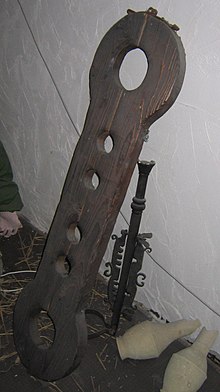| Revision as of 08:39, 4 May 2008 editBlechnic (talk | contribs)3,540 edits →History: a professor's personal page about his travels isn't necessarily credible either← Previous edit | Revision as of 08:45, 4 May 2008 edit undoBidgee (talk | contribs)Autopatrolled, Extended confirmed users, Pending changes reviewers, Rollbackers52,550 edits Undid revision 210070011 by Blechnic (talk) I see nothing wrong with the sourceNext edit → | ||
| Line 5: | Line 5: | ||
| ==History== | ==History== | ||
| The shrew's fiddle was used in places such as ] and ], where it was known as a ''Halsgeige'', meaning "neck viola"<ref name="Vienna" /> or "neck violin".<ref name="Kuenning">{{cite web|url=http://www.cs.hmc.edu/~geoff/adventures/karlsruhe/rothenburg/|title=Rothenburg|accessdate=2008-05-04}}</ref> |
The shrew's fiddle was used in places such as ] and ], where it was known as a ''Halsgeige'', meaning "neck viola"<ref name="Vienna" /> or "neck violin".<ref name="Kuenning">{{cite web|url=http://www.cs.hmc.edu/~geoff/adventures/karlsruhe/rothenburg/|title=Rothenburg|accessdate=2008-05-04}}</ref> It was originally made out of two pieces of wood which were fitted with a ] and a lock at the front. The shrew's fiddle consisted of three holes. One was a large hole for the head and neck to fit through and the other two were smaller holes which fastened the arms in front of the victim.<ref name="Vienna" /> | ||
| It was first used to punish women who were caught fighting or arguing with other people.<ref name="Vienna" /> Another version was the "double fiddle", which allowed two people to be attached together, face-to-face. This forced the two people to talk to each other. They were not released until the argument had been resolved.<ref name="Kuenning" /> | It was first used to punish women who were caught fighting or arguing with other people.<ref name="Vienna" /> Another version was the "double fiddle", which allowed two people to be attached together, face-to-face. This forced the two people to talk to each other. They were not released until the argument had been resolved.<ref name="Kuenning" /> | ||
Revision as of 08:45, 4 May 2008


A shrew's fiddle or neck violin is a variation of the yoke, pillory or rigid irons whereby the wrists are locked in front of the bound person by a hinged board or steel bar. It was originally used in the 18th century as a way of punishing women who were caught arguing or fighting.
History
The shrew's fiddle was used in places such as Germany and Austria, where it was known as a Halsgeige, meaning "neck viola" or "neck violin". It was originally made out of two pieces of wood which were fitted with a hinge and a lock at the front. The shrew's fiddle consisted of three holes. One was a large hole for the head and neck to fit through and the other two were smaller holes which fastened the arms in front of the victim.
It was first used to punish women who were caught fighting or arguing with other people. Another version was the "double fiddle", which allowed two people to be attached together, face-to-face. This forced the two people to talk to each other. They were not released until the argument had been resolved.
References
- ^ "Rothenburg ob der Tauber - Criminal Museum shows Iron Maiden, neck violins and Chastity belts". Retrieved 2008-05-04.
- ^ "Museum of Medieval legal history - Halsgeige (neck-viola) and Shame-mask - Medieval torture". Retrieved 2008-05-04.
- ^ "Rothenburg". Retrieved 2008-05-04.